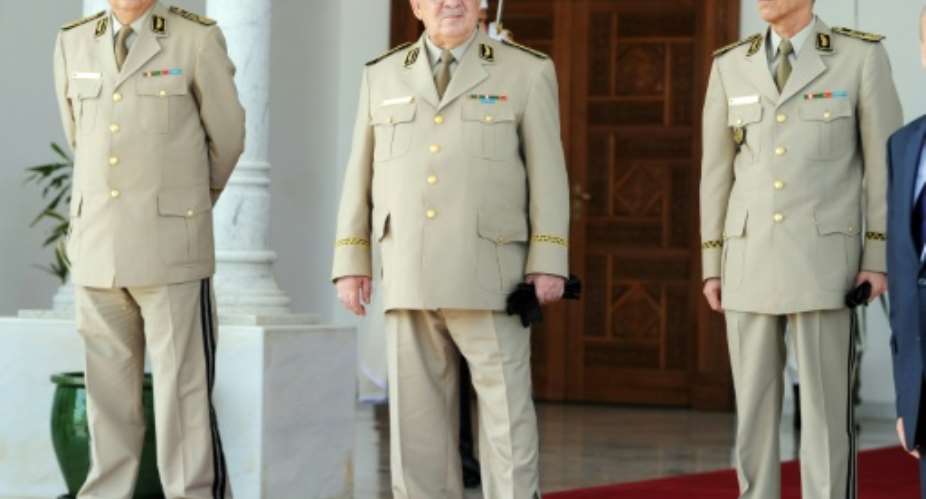As chief of Algeria's military for a record 15 years, General Ahmed Gaid Salah has became the country's de facto leader after longtime president Abdelaziz Bouteflika resigned in April.
Many now see the general, a veteran of Algeria's war for independence, as the guardian of the military-dominated system that has been in power ever since.
He has acted as the key driving force behind Thursday's presidential election.
When Bouteflika appointed him in 2004 to head the armed forces -- the backbone of Algeria's opaque regime -- he became one of the North African country's most powerful men.
For years, Gaid Salah unwaveringly supported Bouteflika, even backing the octogenarian's unpopular bid early this year for a fifth term in office.
But the president's February announcement that he would stand for election yet again sparked weeks of unprecedented mass demonstrations.
In early April, Gaid Salah called on his boss to resign; Bouteflika quit the same day.
That left the army chief effectively in control of the country.
'A brutal soldier'
Born in 1940 in Batna region, some 300 kilometres (190 miles) southwest of Algiers, Gaid Salah has spent more than six decades in the armed forces.
At the age of 17, he joined Algeria's National Liberation Army in its gruelling eight-year war against French colonial forces.
When the North African country proclaimed its independence in 1962 after 132 years as a French colony, he joined the army, attended a Soviet military academy and rose through the ranks.
Gaining a reputation for a hot temper, he commanded several regions before becoming chief of Algeria's land forces at the height of a decade-long civil war pitting the regime against Islamist insurgents.
 Algerian protesters who once praised Gaid Salah for his intervention to force Bouteflika's resignation now despise the general. By - (AFP/File)
Algerian protesters who once praised Gaid Salah for his intervention to force Bouteflika's resignation now despise the general. By - (AFP/File)
In 2004, as he hit retirement age, he was picked by Bouteflika to replace chief of staff Mohamed Lamari, who opposed the president's quest for a second mandate.
By 2013, he had helped Bouteflika dismantle the feared DRS intelligence agency, sending its powerful head Mohamed "Toufik" Mediene into retirement two years later.
Today, the DRS is defanged, Bouteflika is off the scene and many of his allies are being prosecuted for graft as part of investigations encouraged by Gaid Salah.
That has left the military chief, who is also deputy defence minister, undisputedly in charge of Algeria.
He has issued veiled threats to demonstrators and exercises considerable influence over the justice department and the civilian administration of interim president Abdelkader Bensalah.
Flavien Bourrat, a researcher at the Institut de Recherche Strategique de l'Ecole Militaire (Inserm) in Paris, said Gaid Salah enjoys relatively unified support within the army.
But protesters, who once praised him for his intervention to force Bouteflika's resignation, now despise the general.
He has categorially rejected their key demands -- deep reforms, the establishment of transitional institutions and the dismantling of the military-dominated regime.
Indeed, he has made virtually no concessions.
The poll has been widely rejected by protesters, who say no vote can be valid until regime figures have left office and reforms have been carried out.
"Gaid Salah is not a great strategist. He acts like a brutal soldier," said Moussaab Hammoudi, a PhD candidate at the School for Advanced Studies in the Social Sciences (EHESS) in Paris.
"He is a frustrated person (who) acts by impulse, without reflection, without consultation," he added.
"For him, Algeria is a huge barracks, and making a concession is a weakness."





 Ghana will make maiden voyage into space should Bawumia become President — Chair...
Ghana will make maiden voyage into space should Bawumia become President — Chair...
 Train crash: Despite the sabotage, we shall not be deterred and will persevere —...
Train crash: Despite the sabotage, we shall not be deterred and will persevere —...
 Tema-Mpakadan railway project a perversion of the original viable concept design...
Tema-Mpakadan railway project a perversion of the original viable concept design...
 Train crash: Elsewhere, everyone involved in the test will either be fired or re...
Train crash: Elsewhere, everyone involved in the test will either be fired or re...
 Ghana, other election bound-countries must build fiscal buffers – IMF admonishes
Ghana, other election bound-countries must build fiscal buffers – IMF admonishes
 Parliament reconvenes late May, denies Speaker Bagbin delaying recall over NDC t...
Parliament reconvenes late May, denies Speaker Bagbin delaying recall over NDC t...
 $100m needed to revitalise Ghana's poultry sector — GNAPF
$100m needed to revitalise Ghana's poultry sector — GNAPF
 Driver arrested for causing train collision on Tema-Mpakadan Railway Line
Driver arrested for causing train collision on Tema-Mpakadan Railway Line
 Police grab trucker for Tema-Mpakadan rail accident
Police grab trucker for Tema-Mpakadan rail accident
 Gov't plans to revise traditional customs following Gborbu child marriage
Gov't plans to revise traditional customs following Gborbu child marriage
